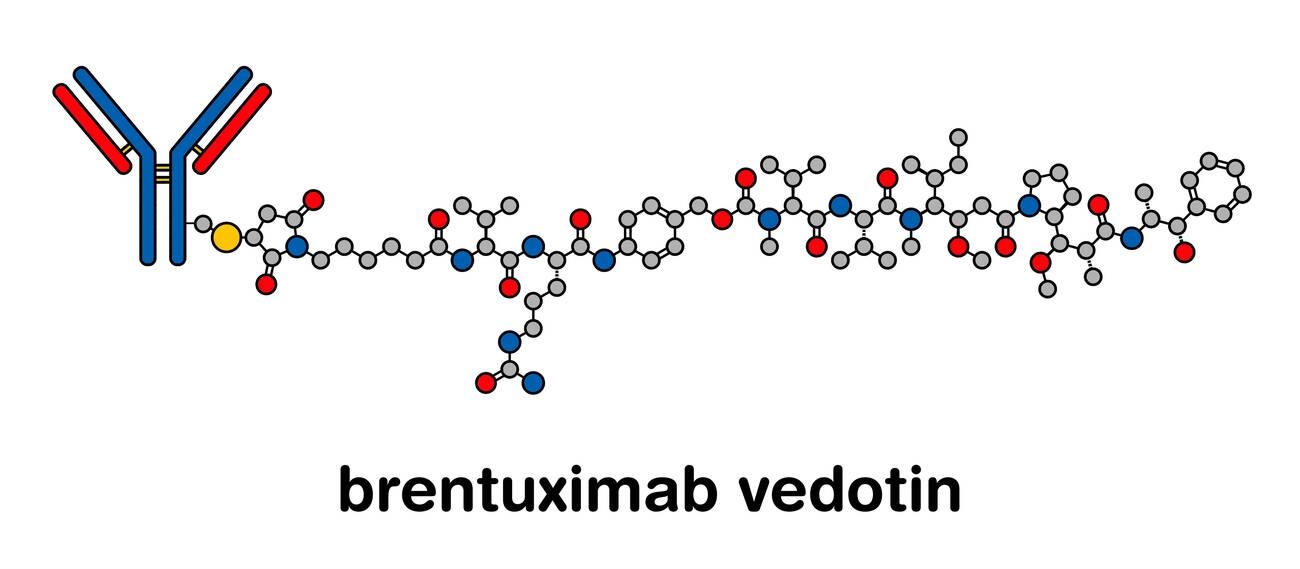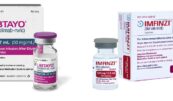Brentuximab vedotin is approved by FDA in combination with chemotherapy for pediatric patients with classical Hodgkin lymphoma
November 2022: The combination of doxorubicin, vincristine, etoposide, prednisone, and cyclophosphamide with brentuximab vedotin (Adcetris, Seagen, Inc.) has been approved by the Food and Drug Administration for use in children and young adults with high-risk classical Hodgkin lymphoma who have not received treatment in the past (cHL). This is brentuximab vedotin’s first paediatric approval.
A randomised, open-label, actively controlled trial was used to assess effectiveness. Stage IIB with bulk illness in Ann Arbor, Stage IIIB, Stage IVA, and Stage IVB were all classified as high risk. Brentuximab vedotin plus doxorubicin (A), vincristine (V), etoposide (E), prednisone (P), and cyclophosphamide (C) [brentuximab vedotin + AVEPC] was given to 300 patients, while A+bleomycin (B)+V+E+P+C [ABVE-PC] was given to 300 patients. Each treatment arm’s patients could have had up to 5 cycles of the following:
Prednisone 20 mg/m2 BID (days 1-7), cyclophosphamide 600 mg/m2 (days 1 and 2), doxorubicin 25 mg/m2 (days 1 and 2), vincristine 1.4 mg/m2 (days 1 and 8), etoposide 125 mg/m2 (days 1-3), and brentuximab vedotin 1.8 mg/kg over 30 minutes (day (days 1 and 2).
Event-free survival (EFS), which is the time from randomization to the earliest of disease progression or recurrence, second malignancy, or death from any cause, served as the primary effectiveness outcome measure. In neither arm was the median EFS attained. With a comparable hazard ratio of 0.41 (95% CI: 0.25, 0.67; p=0.0002), there were 52 occurrences (17%) in the ABVE-PC arm and 23 events (8%) in the brentuximab vedotin + AVEPC arm.
In paediatric patients receiving brentuximab vedotin in combination with AVEPC, neutropenia, anaemia, thrombocytopenia, febrile neutropenia, stomatitis, and infection were the most frequent Grade 3 adverse events (5%).
For children 2 years of age and older, the suggested brentuximab vedotin dose is 1.8 mg/kg up to 180 mg in conjunction with AVEPC every 3 weeks for a maximum of 5 doses.
View full prescribing information for Adcetris.
Dr. Nishant Mittal is a highly accomplished researcher with over 13 years of experience in the fields of cardiovascular biology and cancer research. His career is marked by significant contributions to stem cell biology, developmental biology, and innovative research techniques.
Research Highlights
Dr. Mittal's research has focused on several key areas:
1) Cardiovascular Development and Regeneration: He studied coronary vessel development and regeneration using zebrafish models1.
2) Cancer Biology: At Dartmouth College, he developed zebrafish models for studying tumor heterogeneity and clonal evolution in pancreatic cancer.
3) Developmental Biology: His doctoral work at Keio University involved identifying and characterizing medaka fish mutants with cardiovascular defects.
4) Stem Cell Research: He investigated the effects of folic acid on mouse embryonic stem cells and worked on cryopreservation techniques for hematopoietic stem cells.
Publications and Presentations
Dr. Mittal has authored several peer-reviewed publications in reputable journals such as Scientific Reports, Cardiovascular Research, and Disease Models & Mechanisms1. He has also presented his research at numerous international conferences, including the Stanford-Weill Cornell Cardiovascular Research Symposium and the Weinstein Cardiovascular Development Conference.
In summary, Dr. Nishant Mittal is a dedicated and accomplished researcher with a strong track record in cardiovascular and cancer biology, demonstrating expertise in various model systems and a commitment to advancing scientific knowledge through innovative research approaches.
- Comments Closed
- November 17th, 2022





classical Hodgkin lymphoma, Seagen Inc
CancerFax is the most trusted online platform dedicated to connecting individuals facing advanced-stage cancer with groundbreaking cell therapies.
Send your medical reports and get a free analysis.
🌟 Join us in the fight against cancer! 🌟
Привет,
CancerFax — это самая надежная онлайн-платформа, призванная предоставить людям, столкнувшимся с раком на поздних стадиях, доступ к революционным клеточным методам лечения.
Отправьте свои медицинские заключения и получите бесплатный анализ.
🌟 Присоединяйтесь к нам в борьбе с раком! 🌟